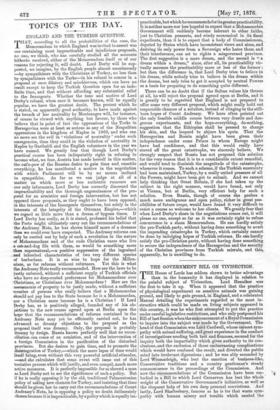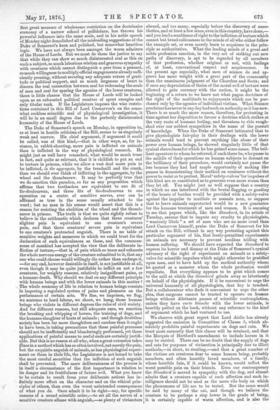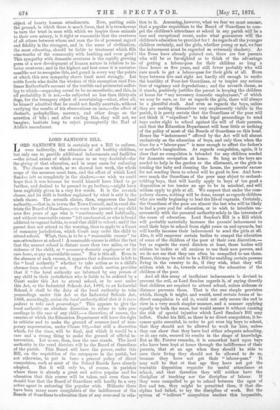THE GOVERNMENT BILL ON VIVISECTION. T HE House of Lords has
seldom shown to better advantage than in the humanity it has displayed in relation to the painful subject of Vivisection. Lord Henniker was the first to take it up. When it appeared that the practice of physiological experiment on sensitive animals was gaining ground, and likely to gain ground, in England, and a celebrated Manual detailing the experiments regarded as the most in- structive which could be made on living subjects appeared in this country, it was he who first attempted to put the practice under careful legislative restrictions, and who only postponed his Bill of last Session when the announcement of a Royal Commission to inquire into the sabject was made by the Government. The head of that Commission was Lord Cardwell, whose earnest sym- pathy with animal suffering, and great experience in the conduct of investigations needing both tact and firmness, secured for the inquiry both the impartiality which gives authority to its con- clusions, and the exclusion of those embarrassing complications which would have confused the result, and diverted the public mind into irrelevant digressions ; and he was ably seconded by Lord Winmarleigh, who lent the sanction of business-like, Conservative traditions and a country gentleman's steady common-sense to the proceedings of the Commission. And now the recommendations of the Commission have been em- bodied in a Bill to which Lord Carnarvon has lent the whole weight of the Conservative Government's initiative, as well as the eloquent help of his own deep personal convictions. And lastly, Lord Shaftesbury, famous as he is for that warm sym- pathy with human misery and trouble which carried the first great measure of -wholesome restriction on the doctrinaire economy of a narrow school of politicians, has thrown his powerful influence into the same scale, and in his noble speech of Monday night demolished all the misleading suggestions of the Duke of Somerset's keen and polished, but somewhat heartless logic. We have not always been amongst the warm admirers of the House of Lords. But we must do them the justice to say that while they can show so much disinterested zeal as this on such a subject, so much laborious wisdom and generous sympathy with creatures which cannot distinguish a peer from a peasant, so much willingness to multiply official engagements already suffi- ciently pressing, without securing any adequate return of grati- tude or political support, and so much largeness of heart to discern the real connection between zeal for redeeming the souls of men and zeal for sparing the agonies of the lower creatures, there is little chance that the House of Lords will be looked upon as an exhausted political receiver of spent energies and only titular rank. If the Legislature imposes the wise restric- tions contained in this Bill of Lord Carnarvon's on the some- what reckless scientific zeal of physiological investigation, it will be in no small degree due to the perfectly disinterested humanity of the House of Lords.
The Duke of Somerset's speech on Monday, in opposition to, or at least in hostile criticism of the Bill, seems to us singularly weak and narrow. His chief argument, if argument it could be called, was of this kind,—that in other ways, as, for in- stance, in rabbit-shooting, more pain is inflicted on animals than is inflicted in the way of physiological research. He might just as well have remarked, what would be much truer in fact, and quite as relevant, that it is childish to put an end to torture in prisons, while we allow a vast deal more pain to be inflicted, in the aggregate, by the treadmill and the crank, than we should ever think of inflicting in the aggregate, by the wheel and the thumbscrew. It may be perfectly true that we do sanction this paradox, so far as any proposition which affirms that two toothaches are equivalent to one fit of tic-douloureux, and three fits of tic-douloureux to one operation on a centre of sensitive nerves, ever can be affirmed as true in the sense usually attached to the word ; but no man in his senses would assert that this is a reason for resisting the abolition of the wheel and the thumb- screw in prisons. The truth is that we quite rightly refuse to believe in the arithmetic which declares that three creatures' slighter pain is equivalent to one creature's severe pain, and that three creatures' severe pain is equivalent to one creature's protracted anguish. There is no table of sensitive weights and measures to which we could trust for the declaration of such equivalences as these, and the common- sense of mankind has accepted the view that the deliberate in- fliction of torture,—that is, of pain which so taxes and exhausts the whole nervous energy of the creature submitted to it, that any one who could choose would willingly die rather than undergo it, —for any end, however desirable in itself, is not justifiable at all, even though it may be quite justifiable to inflict on not a few creatures, for weighty reasons, relatively insignificant pains, or a humane death. Why should we deal on any different principle with human beings and with the lower animals in this matter ?
The whole economy of life in relation to human beings consists in imposing a regulated system of pains and pleasures on the performance of certain acts. We fine, we imprison, we flog, we sentence to hard labour, we shoot, we hang, those human beings who violate in different degrees the rules of civil society. And for different reasons, but still adequate ones, we sanction the breaking and whipping of horses, the training of dogs, and the humane slaughter of hosts of animals ; and though doubtless society has been far more thoughtless and careless than it ought to have been, in taking precautions that these painful processes should not be inefficiently and blunderingly performed, yet these applications of painful means to useful ends are certainly justifi- able. But this is no reason at all why, when a great extension takes Pace in a method which has so often involved, not merely the pain, but the exquisite anguish of animals, as has physiological experi- ment on them in their life, the Legislature is not bound to take the most careful securities that the infliction of such anguish shall be prevented. The mere deliberateness of the process is in itself a circumstance of the first importance in relation to its danger and its fruitfulness of future evil. What you know to be certain to result from your deliberate actions has in- finitely more effect on the character and on the ethical prin- ciples of others, than even the worst unintended consequences of what you do. Once admit it to be right—say, for specific reasons of a sound scientific order,—to set all the nerves of a sensitive creature aflame with anguish,—as plenty of vivisectors abroad, and too many, especially before the discovery of antes- thetics, and at least a few since, even in this country, have done,— and you lend a semblance of right to the infliction of torture which cannot but breed callousness in the minds of all who either follow the example set, or even merely learn to acquiesce in the prin- ciple as authoritative. What the leading minds of a great and noble profession sanction, in the very act of striking out new paths of discovery, is apt to be regarded by all members of that profession, whether original or not, with feelings of, at least, conventional respect and acquiescence. In the present age especially, what men of science do and ap- prove has more weight with a great part of the community than the unanimous judgment of the Churches and Sects; and if once any depreciation of theirs of the moral evil of torture were allowed to gain currency with the nation, it might be the beginning of a return to we know not what pagan doctrines of the right of the multitude to enjoyments which can be pur- chased only by the agonies of individual victims. What. Science proclaims has never in any day had such an authority as it has now. There is so much the more reason, therefore, for protesting in time against her disposition to favour a doctrine which strikes at the very roots of humane feeling, and threatens to ride rough- shod over our noblest sympathies in the name of the pursuit of knowledge. When the Duke of Somerset intimated that to give physiologists fair-play in their dealings with the lower animals would tend to prevent anything like abuse of their power over human beings, he showed singularly little of that cynical shrewdness for which he has gained some name. The bril- liant operators to whom he referred, if such there be, who pause in the middle of their operations on human subjects to descant on the brilliancy of their procedure, would certainly not pause the less because they had had ample opportunity of making like pauses in demonstrating their method on creatures without the power to resist or to protest. Moral' safety-valves' for impulses of this kind are so constituted as to generate even more steam than they let off. You might just as well suppose that a country in which no one interfered with the brutal flogging or goading of the beasts of burden would be provided with a safety-valve against the impulse to mutilate or assassin men, as suppose that to leave animals unprotected would be a new guarantee for the humane treatment of men and women. It is amusing to see that papers which, like the Standard, in its article of Tuesday, assume that to impute any cruelty to physiologists, "wantonly libels" a set of men who are no more cruel than Lord Carnarv on himself, praise the Duke of Somerset for his attack on the Bill, without in any way protesting against this particular argument of his, that freely-permitted experiments on animals are necessary to prevent needless trifling with human suffering. We should have expected the Standard to express its horror and dismay at the Duke of Somerset's cynical advocacy of the right of experiment on animals as a safety- valve for scientific impulses which might otherwise be gratified upon man, and to have held up the medical authority whom he quoted as a monster whom the whole profession would repudiate. But everything appears to be grist which comes to the mill at which the Standard grinds away so laboriously on behalf of the physiologists. If it be convenient to urge the universal humanity of all physiologists, that key is touched. But a collaborateur who finds it convenient to urge the other plea, that surgeons cannot be trusted to operate on human beings without dilettante pauses of scientific contemplation, unless they have carte blanche with the lower animals, is heartily patted on the back, without any reference to the kind of argument which he had ventured to use.
We observe with great regret that Lord Airlie has already suggested the omission in Committee of Clause 5, which ab- solutely prohibits painful experiments on dogs and cats. We trust most earnestly that this clause will be retained, and that the Marquis of Hertford's amendment to include horses in it may be carried. There can be no doubt that the supply of dogs and cats for purposes of vivisection is principally due to illicit methods,—in short, to stealing,—and that a great number of the victims are creatures dear to some human being, probably members, and often heartily loved members, of a family, whose horrible fate, if it could be known, would inflict the worst possible pain on their friends. Even our contemporary the Standard is moved to sympathy with the dog, and almost admits that a creature capable of such affection and such in- telligence should not be used as the mere vile body on which the phenomena of life are to be tested. But the same would be said by many of the cat, and though we believe the creature to be perhaps a step lower in the grade of being, it is certainly capable of warm affection, and is also the object of hearty human attachments. Now, putting aside the ground, in which there is much force, that it is treacherous to turn the trust in man with which we inspire these animals to their own misery, is it right or reasonable that the creatures of all others between whom and man the tie of personal regard and fidelity is the strongest, and in the sense of civilisation, the most educating, should be liable to treatment which fills nine-tenths of the community with loathing and even grief? This sympathy with domestic creatures is the rapidly growing germ of a new development of human nature in relation to in- ferior creatures; and in the highest and best sense it is unstates- manlike not to recognise this, and guard in every way the points at which this new sympathy shows itself most strongly. Let noble Lords who doubt the wisdom of this exemption read Pro- fessor Rutherford's account of the terrible and protracted suffer- ing to which—supposing curari to be no anesthetic, and this, in all probability it is not,—he subjected no less than thirty-six dogs, for the trumpery object of ascertaining—what, after all, he himself admitted that he could not finally ascertain, without verifying the results of his observations on men,—the effect of rhubarb, podophylline, mercury, and other drugs on the secretion of bile ; and after reading this, they will not, we imagine, hesitate long to reject peremptorily the Earl of Airlie's amendment.
































 Previous page
Previous page